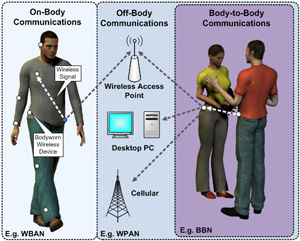Nov 12 2010
Telephonic calls can be made using cell phones by virtue of the signals that have been transmitted wirelessly between huge base stations.
 Wearable sensors
Wearable sensors
This sort of transmission between the stations if hindered, by a large infrastructure will result in poor communication grid coverage. Recently, technology has advanced to such an extent that, it may be possible to substitute mobile phones with wearable sensing units that have the potentiality to generate cable-free signals and thus facilitate enhanced mobile grid coverage.
Dr Simon Cotton, a scientist at Institute of Electronics, Communications and Information Technology, Queen’s University Belfast, anticipates that with the advent of innovative technologies, the signals from mobile phones can be made possible to communicate between people, wearing specific sensing devices. He comments that this process will produce body-to-body networks’ (BBNs) which will help in lowering the density at the base station and will create network coverage all the time at any place.
Dr. Cotton stated in DailyTech that BBNs consume reduced energy than conventional base stations and these BBNs can also be deployed for monitoring health signals for instance, the heart rate.
According to Simon Piper, Mobilechoices.co.uk’s business development manager, wearing the sensors for transmitting the signals is a significant method for improving network coverage and will help broadening the method of communication and also the determination of our health status.